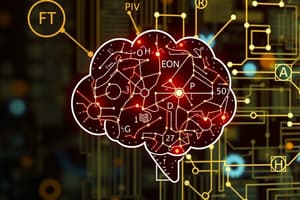Podcast
Questions and Answers
What is problem decomposition in computational thinking?
What is problem decomposition in computational thinking?
Problem decomposition involves breaking down a complex task into smaller, manageable parts to make it easier to solve.
How does abstraction contribute to computational thinking?
How does abstraction contribute to computational thinking?
Abstraction allows one to focus on the essential features of a problem while ignoring irrelevant details, facilitating better problem solving.
Explain the concept of recursive thinking in computational terms.
Explain the concept of recursive thinking in computational terms.
Recursive thinking involves solving a problem by solving smaller instances of the same problem until a base case is reached.
What is the significance of recognizing both the power and dangers of aliasing in programming?
What is the significance of recognizing both the power and dangers of aliasing in programming?
How does computational thinking enhance analytical ability in children?
How does computational thinking enhance analytical ability in children?
What is meant by the separation of concerns in system design?
What is meant by the separation of concerns in system design?
In what ways does code interpretation as data benefit computational thinking?
In what ways does code interpretation as data benefit computational thinking?
Describe the role of type checking in computational thinking.
Describe the role of type checking in computational thinking.
How does problem decomposition contribute to solving complex systems?
How does problem decomposition contribute to solving complex systems?
What is the role of abstraction in computational thinking?
What is the role of abstraction in computational thinking?
How does recursive thinking aid in understanding computational problems?
How does recursive thinking aid in understanding computational problems?
In what ways can redundancy contribute to error correction in systems?
In what ways can redundancy contribute to error correction in systems?
What is heuristic reasoning, and how is it applied in discovering solutions?
What is heuristic reasoning, and how is it applied in discovering solutions?
Why is planning important in computational thinking?
Why is planning important in computational thinking?
How do concepts like nondeterminism and garbage collection impact system design?
How do concepts like nondeterminism and garbage collection impact system design?
What is meant by 'race conditions' in computational contexts, and how can they be avoided?
What is meant by 'race conditions' in computational contexts, and how can they be avoided?
What is the significance of problem decomposition in computational thinking?
What is the significance of problem decomposition in computational thinking?
How does abstraction contribute to computational thinking?
How does abstraction contribute to computational thinking?
In what way does recursive thinking reflect cognitive processes in problem-solving?
In what way does recursive thinking reflect cognitive processes in problem-solving?
Can you give an example of how everyday activities employ problem decomposition?
Can you give an example of how everyday activities employ problem decomposition?
What role does data structure play in computer science's contribution to biology?
What role does data structure play in computer science's contribution to biology?
Explain the concept of caching in terms of computational thinking.
Explain the concept of caching in terms of computational thinking.
What is the purpose of backtracking in problem-solving, and how can you relate it to everyday experiences?
What is the purpose of backtracking in problem-solving, and how can you relate it to everyday experiences?
Describe how computational thinking is reshaping the approach of various scientific disciplines.
Describe how computational thinking is reshaping the approach of various scientific disciplines.
Study Notes
Overview of Computational Thinking
- Addresses the question of what is computable, extending beyond just computer scientists to everyone.
- Fundamental skill added to reading, writing, and arithmetic, necessary for analytical ability.
Key Concepts of Computational Thinking
- Involves recursive thinking and parallel processing, interpreting code as data and vice versa.
- Includes type checking, dimensional analysis, and recognizing the implications of aliasing—giving a name to multiple entities.
- Emphasizes the importance of indirect addressing and procedure calls.
- Evaluates programs not only for correctness and efficiency but also for aesthetics and simplicity.
Problem-Solving Framework
- Applies abstraction and decomposition to tackle complex tasks or systems.
- Encourages separation of concerns and appropriate representation of problems.
- Utilizes massive data processing to speed up computation and manage time, space, and power trade-offs.
Everyday Examples of Computational Thinking
- Prefetching and caching represented by preparing a backpack for school.
- Backtracking illustrated by retracing one’s steps to find lost items.
- Online algorithms showcased through decision-making about renting or buying equipment.
Impact on Various Disciplines
- Influences biology through computational biology, enhancing understanding of protein structures.
- Affects economics via computational game theory.
- Transforms chemistry with nanocomputing concepts.
- Reshapes physics through quantum computing principles.
Future of Computational Thinking
- Seen as foundational for not just scientists but everyone, similar to the role of ubiquitous computing today.
- Involves using invariants to succinctly describe system behaviors, building confidence in manipulating complex systems.
Evolution of Computational Thinking
- Reflects on how it has transformed disciplines such as statistics through statistical learning and machine learning.
- Highlights the collaboration between computer science departments and statistics departments in educational institutions, adapting to large-scale problems.
Studying That Suits You
Use AI to generate personalized quizzes and flashcards to suit your learning preferences.
Related Documents
Description
This quiz explores the essentials of computational thinking, including key concepts such as recursion, parallel processing, and the relationship between code and data. It emphasizes the importance of these skills not only for computer scientists but for everyone in today's digital world. Test your understanding of these foundational ideas and their applications.




